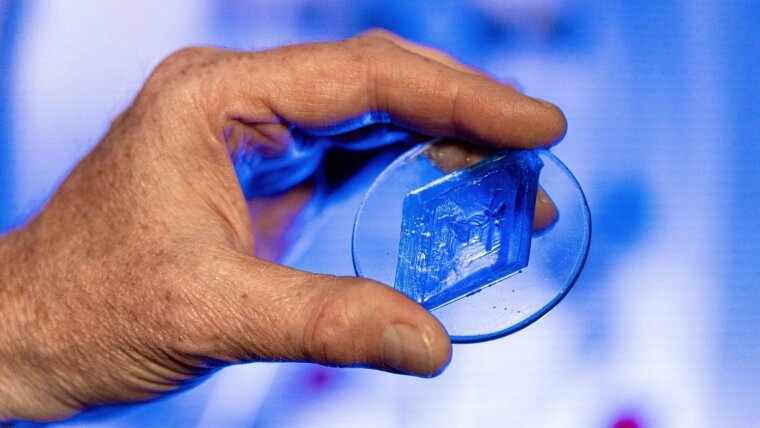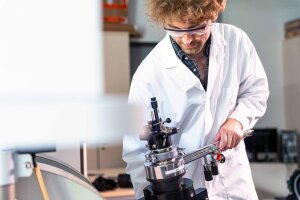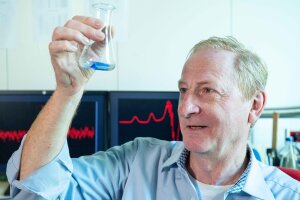
- Light
- Research
Published: | By: Sebastian Hollstein
Dr Benjamin Kintzel is co-author of the paper. He investigates spin-electric effects on an electron spin resonance spectrometer.
Image: Nicole Nerger (Universität Jena)A few years ago, chemists at Friedrich Schiller University Jena developed a molecule that can function as a potential qubit—i.e. as a computing unit in a quantum computer. With the help of this copper complex, they have now enormously increased the possibilities for future developments in quantum technology together with colleagues from the University of Florence. For the first time, they have succeeded in controlling the spin state of a molecule directly with electric fields by specifically intervening in the interactions between the spins. The team reports on its research findings in the research journal »Nature Communications«.
In order to be able to use molecules as qubits, the spin—i.e. the intrinsic angular momentum of the electrons—is crucial. The longer-lived a spin state is, the more suitable the molecule is as a storage unit. Furthermore, the way in which spins are controlled is decisive for the performance of the qubit.
But how can the spin be controlled in a targeted manner? »Normally, this is only possible with magnetic fields or via a diversion known as spin-orbit coupling, which only works with electrons whose movement around the atomic nucleus is not spherically symmetrical, so that these electrons experience an effective magnetic field in the strong electric field of the nucleus from their point of view, which acts on their spin,« says Prof. Dr Winfried Plass, who heads the project team at the University of Jena. »We have now succeeded for the first time in influencing the spin directly from the outside—i.e. without spin-orbit coupling—by means of an electric field.«
Geometrically frustrated spin system
»Our trinuclear copper complex features what is known as a geometrically frustrated spin system. This means that there are three spins that actually want to align themselves antiparallel to their neighbours. However, due to the triangular arrangement, this wish cannot be fulfilled for all of them at the same time. This is comparable to three magnets at the corners of a triangle that each want to align themselves north pole to south pole—this is never possible for all of them at the same time, so the spins arrange themselves at a compromise angle to each other,« explains the Jena chemist. »The resulting direction of rotation—either clockwise or anti-clockwise—corresponds to the spin chirality of this frustrated system, which distinguishes between two equivalent states of minimal energy.«
The researchers have now attached an electric field to such a formation in the plane of the triangle that connects the three spins, thereby manipulating the entire spin system. The researchers were able to determine the influence from a change in the coupling constant, i.e. the value that provides information on how strongly spins interact with each other. The decisive factor for the interaction between the electric field and the spin is the ligand of the molecule—i.e. the special organic compound that connects the three spins. The experiments have shown that this »spin bridge« can be changed by the electric field and that the changes are passed on to the coupling between the spins.
Head of the project Prof. Dr Winfried Plass from the Institute of Inorganic and Analytical Chemistry at the University of Jena.
Image: Nicole Nerger (Universität Jena)Electric fields enable more powerful quantum computers
The chemists used a spectroscopic method for their experiments: electron spin resonance, ESR (or EPR) for short, which can be used to investigate whether electric fields influence the spin state of a molecule—so-called spin-electric effects. In a crystal made of these copper complexes, the spatial dependence—i.e. the anisotropy—of this effect can be investigated in particular.
By proving that spin states in molecules can be directly influenced by electric fields, the research team is opening up new perspectives for quantum technology. »Electric fields are more precise, faster and easier to control,« says Winfried Plass. »Qubit systems on this basis could therefore enable more powerful and energy-efficient quantum computer concepts.« Thanks to the present research results and the identified role of the ligand, molecules can be customized for such applications in the future.
Original publication:
Alberto Cini et al: Electric control of magnetic exchange in a molecular spin triangle, Nature Communications, 2025, DOI: 10.1038/s41467-025-61417-6, https://www.nature.com/articles/s41467-025-61417-6External link
Contact:
07743 Jena Google Maps site planExternal link

